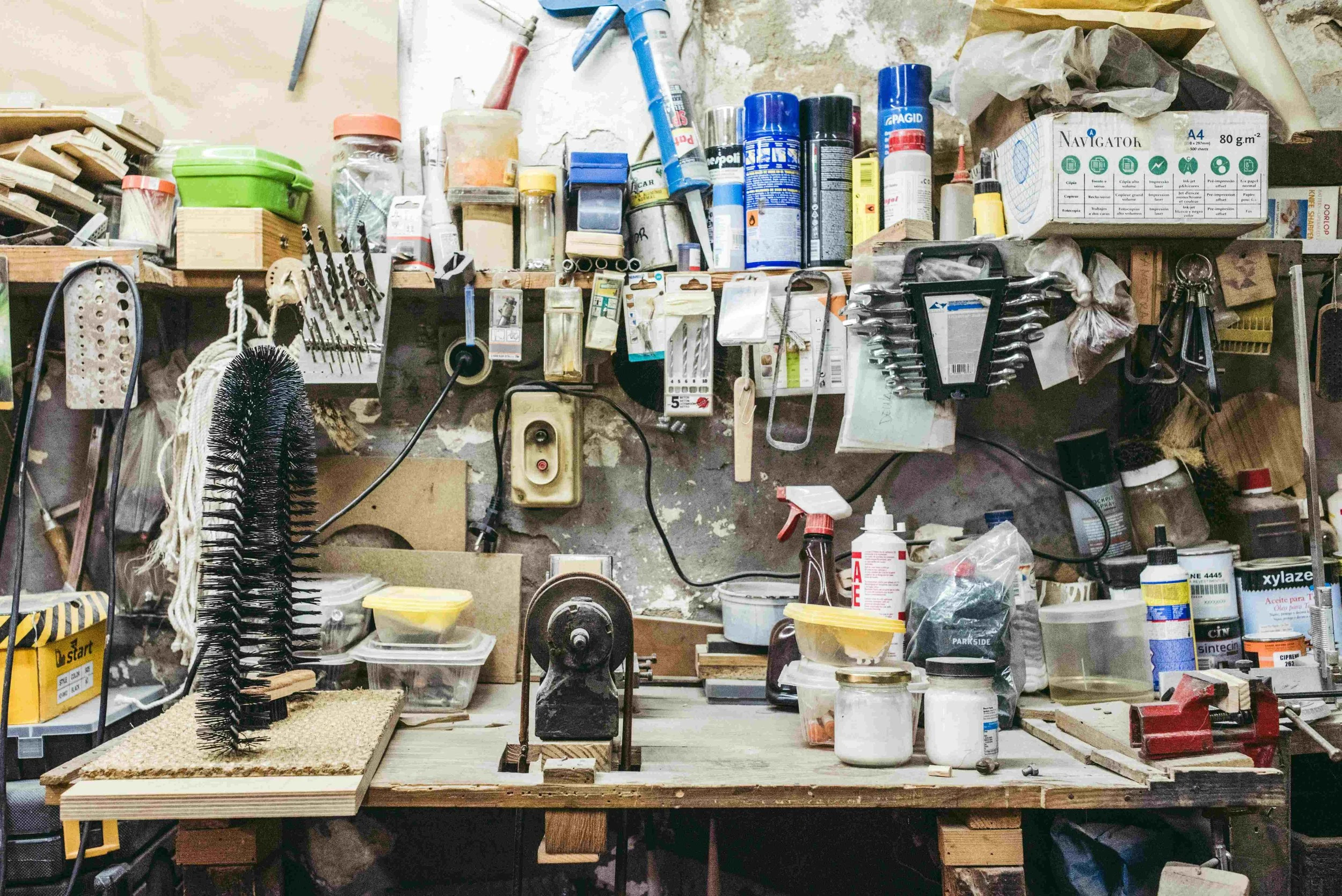Do you have mild OCD ?
It's important not to trivialise OCD as it can be a very debilitating condition. However, many people today report recognising traits in themselves that they associate with mild OCD.
Common signs of mild OCD include obsessive symmetry, counting or repeating phrases in one's head, arranging items, excessive washing and cleaning, or constantly rechecking things like whether a door is locked. Nevertheless, just because you exhibit these behaviours, it doesn’t necessarily mean you have mild OCD.
Does your workshop or office desk look like this, or would it make you shudder because you are super organised?
Individual behaviour is a reflection of our humanity. None of us are perfect, and we all have our individual ways. It's these quirks and habits that make us who we are.
So, if you want to check if all the labels on your spice jars are perfectly aligned, or that the cereal boxes are lined up by height and colour, you do it.
Exploring the Labels That Shape Us
In today's world, it seems like everything has to have a label. These labels help us identify and acknowledge the issues or problems we face, offering a form of justification for our actions, words, or feelings. There's comfort in this identification, and it’s something we can all understand.
The Misconceptions and Reality
I once watched a documentary on TV that stated you have OCD if you believe there will be consequences for your thoughts. For example, if you're walking down the pavement and you try to avoid all the cracks because you believe that stepping on one will cause your grandmother to have a serious accident, this is OCD. However, if you simply don’t like to step on cracks but don't believe there will be a consequence, this isn't OCD. While this might be a simplified explanation, it highlights an important distinction.
Many TV programs have highlighted the struggles of people with OCD. It's a debilitating condition, and some individuals struggle to even leave their homes because of the need to repetitively turn on and off lights, open and close doors, check windows, and wash their hands over and over again.
We should all strive for understanding and empathy towards those with true conditions like OCD. Various OCD charities are trying to get people to stop using the term 'OCD' incorrectly.
There are some excellent websites by charities and foundations that delve much deeper if you are interested or concerned. There are also tests people can undertake.
OCD in Everyday Conversation
Despite the serious nature of OCD, the term is now often used loosely in everyday conversation. People openly say, "That’s going to mess with my OCD" or "My OCD is going to struggle with that".
It's possibly one of the only mental health issues that people are quite happy to label themselves with. A bit like dyslexia, where people are happy to say they have a form of it if they struggle sometimes with spelling or numbers.
Personal Preferences vs. OCD
Some of us are naturally tidy people who prefer things to be meticulously organised and are detail-oriented. For instance, if you like all the labels on your tins in the kitchen cupboard to face the same way, or if all your mugs must have their handles aligned at the same angle, or if your cutlery tray must be perfectly arranged with no forks in the knife section (how do people manage that?), then that's perfectly okay.
David Beckham once mentioned in a documentary that he likes the labels on his beer bottles in the fridge to face the same way. People commented that he must have OCD because of this preference.
Take my desk at work, for example. I always like to have a clean, tidy workspace with everything in its place. Some individuals can work in a mess of wires, pens, and papers. They arrive at their desks, throw their keys and mobile phones onto a growing pile of random papers, and just start working without a second thought. But for me, I need a clean and organised space before I can begin my work. In an office of 50 people, only about three of us prefer a very tidy desk, but I’m completely fine with that.
Embracing our Quirks
Many people assume that I spend hours tidying my house since there isn't any mess. However, I’m simply someone who doesn't usually create a mess in the first place, so I don’t need to dedicate time to cleaning up. When I use something, I usually put it back where it belongs. I don’t view this as a flaw; it’s just part of my personality, and I’m perfectly fine with it.
If you have habits like organising your books on the shelf from tallest to shortest, embrace them! These quirks don’t necessarily indicate that you have OCD; they just make you who you are.
Final thoughts
Labels can be both comforting and limiting. They help us understand and connect with others who have similar experiences, but it's important to use them thoughtfully. While some people may find solace in labels like OCD, others might feel misunderstood or oversimplified by them.
Ultimately, we are all unique, with our own habits and preferences. Whether we're tidying our desks or organising our kitchen cupboards, these quirks are part of what makes us individual. As long as these behaviours do not negatively impact your life or those around you, it's perfectly fine.
One positive aspect of getting older, especially us Midlifers, is that we start to care less about what others think.
So, be proud of who you are and let's celebrate our differences - Go forth and organise!

